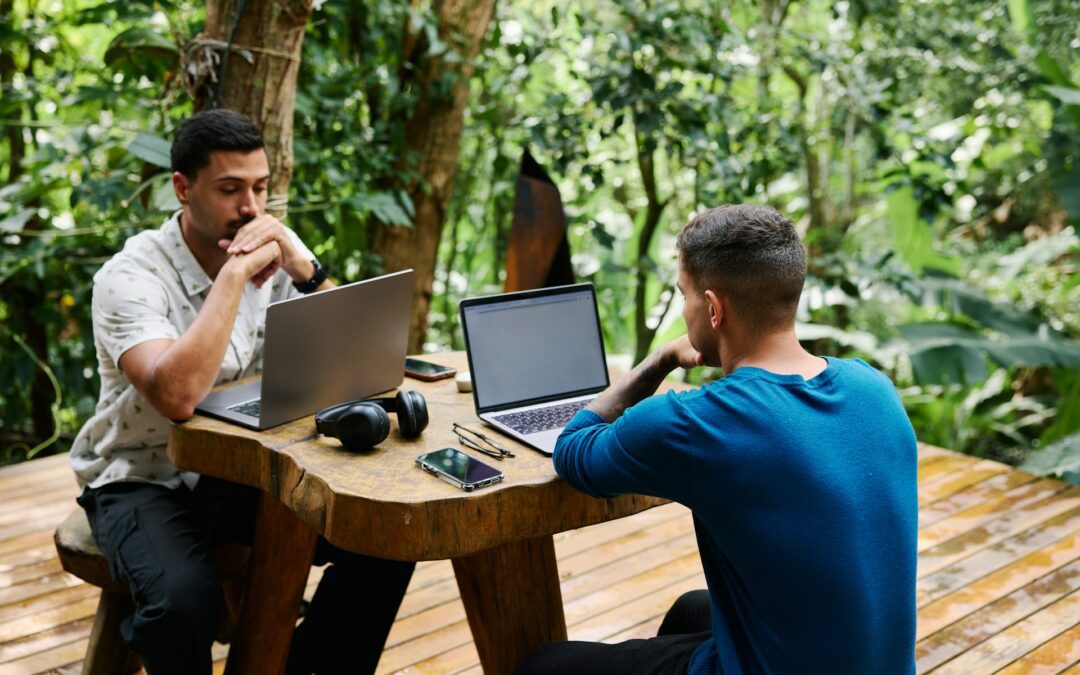|
|
Lauchlan Brown recently wrote a story for the Daily Motivation News about his experiences of meeting digital nomads in Southeast Asia. An entrepreneur and remote worker himself, he has spent a good chunk of the last decade in the region, mostly in Thailand and Vietnam.
He has met many Westerners who have leaped into the digital nomad lifestyle, mostly good people with good intentions, working hard to make their professional and lifestyle dreams a reality.
However, he also comments that recently he has been hearing more and more complaints from his local friends about the swarms of digital nomads coming into the area. Based on these insights, Brown came up with a list of seven “uncomfortable truths” about the Western digital nomad lifestyle.
We’ve talked about many of these before on the blog, but let’s look at Brown’s list and what digital nomads can do to avoid fueling these kinds of issues.
Uncomfortable Truths
Brown gives seven uncomfortable truths about being a Western digital nomad in Southeast Asia, some of which crossover, so let’s look at the complete list first.
#1 Cheap Paradise Mentality
Brown suggested that local friends feel frustrated when Westerners refer to their country as “cheap” and brag that they can live like a king on very little money. This can be especially painful for locals who are earning low local wages and are struggling to make ends meet. Things aren’t cheap for them, and the world diminishes what their country has to offer.
#2 Lack of Cultural Understanding
Locals also expressed frustration at long-term visitors who don’t learn the local language at all or respect local customs. While locals accept that tourists on a two-week trip probably aren’t going to learn a complex new language, they sometimes express frustration with long-term visitors who don’t even try to learn essential phrases and assume that “everyone speaks English.” They also express frustration with long-term visitors who don’t respect local customs, such as local dress and courtesy customs.
#3 Entitlement
An extension of this lack of cultural understanding is a sense of entitlement. Brown described digital nomads who feel like they can do whatever they like because they have money to spend. They complain if people in local businesses don’t speak English, or flaunt visa rules, throwing money at a problem to make it go away. While it might seem like this isn’t hurting anyone, Brown notes that locals often resent this because they don’t have the passport power or the money to bend the rules in the same way.
#4 Echo Chambers & Lack of Integration
Digital nomads and expats often stay in their own bubbles, living in expat communities, frequenting co-working spaces designed to serve foreigners, and mostly mingling with other Westerners. While there is nothing wrong with connecting with like-minded people whom you identify with, doing this almost exclusively can create an “us versus them” atmosphere, especially in areas with large foreign communities.
#5 Inappropriate Behavior & Partying
We’ve already mentioned a lack of respect for local customs, such as visiting temples without covering up, but excessive drinking of “cheap booze” can be a major cause of these types of problems. Visitors often don’t respect limits and find themselves publicly drunk and disturbing the local community with their noise and behavior.
#6 Short-Term Gains vs Long-Term Impact
I would characterize this issue slightly differently as short-term gains for you and long-term impacts for the community. Nomads often don’t consider what their short stay in another country can do to the local economy and community. It can push house prices up as landlords decide that they can make more money on short-term rentals to foreigners. It can lead to gentrification, as businesses open to cater to locals, which become aspirational but not accessible to locals.
#7 Savior Attitude
Brown is not the only observer who has identified the “white savior” attitude, with Westerners showing up and giving unsolicited advice on how to do things better based on their out-of-context experiences, and just a general “I’m more civilized than you” patronizing demeanor.
How to Be a Better Digital Nomad
Based on these uncomfortable truths, what can digital nomads who want to travel and see the world do to be better and more responsible digital nomads?
Be Conscious of Geoarbritrage and Financial Inequality
First, there is the question of financial inequality. Choosing to live somewhere cheaper so that your dollar goes further is sometimes called geoarbitrage. It can apply to people who move from the city to the suburbs or remote working Westerners who move to countries with a more affordable cost of living. But is it ethical? Moving to the suburbs isn’t controversial, but moving to another country can be.
It is important to remember that while a country might be more affordable to you as a foreigner with income from your home country, the reality is very different for locals. Based on my personal experience, I have lived in a country where people earn less in a day than I earn in an hour, so what I consider affordable can be prohibitively expensive for locals.
For example, when I needed medical treatment, I got it privately for a fraction of what I would pay in my home country, plus my insurance covered it, amazing. But it would have cost a local more than they pay in rent for a month, which can put them in the difficult position of choosing between treatment and feeding their family this month. Consequently, it is understandable that locals can feel resentful of people coming to their country and living like kings.
The ethics of where you choose to live is down to the individual, but there are things that digital nomads can do to minimize the negative impact of their financial inequality when living in another country.
First, choose the language you use when discussing the local cost of living carefully. When you are highlighting what is affordable for you, be sure to include the context of local income, and choose words such as affordable rather than “cheap.”
Second, don’t behave like you are in “Disneyland.” While you are within your rights to make the most of your time, see the sights, and live well, don’t flaunt it.
Finally, when you do spend, try and make sure that you are helping the local economy and not just benefiting from it. Spend with local businesses and support local initiatives. Try and be aware of when your purchases can have a negative local impact, especially on things like housing prices.
Seek to Integrate with the Local Community
The majority of Brown’s uncomfortable truths relate to respecting the local culture and trying to integrate with the local community rather than living separately or “above.”
It is important for digital nomads to recognize that there is a big difference between being a tourist and a long-term visitor. No one expects tourists who are traveling around, seeing the sights, and paying a premium for two weeks to learn a complex new language. But if you are living in the local community, shopping in local stores, and benefiting from the local cost of living, you are expected to try and integrate to an extent with the local community.
This starts with learning the language. While you may not be able to learn a challenging new language in a couple of months, you can learn key phrases that show locals that you are making an effort and respect the local culture. Moreover, language is both a product of culture and a creator of culture, so learning the local language will allow you to connect more deeply with the local culture.
It is also important to learn and respect local customs, whether that be never handing someone money directly (but placing money in a tray, as is the custom in many Asian countries) or never using your personal chopsticks in communal bowls. One of the most important customs to remember is how you dress, as it is the most visible, even to strangers. While many countries attractive to digital nomads have tropical climates, they often also consider it inappropriate to wear beachwear anywhere but on the beach; something that Western visitors often ignore.
But the longer you stay in one place, the more you need to move beyond respect to integration. While there is nothing wrong with choosing to live in areas popular with expats, probably because they have safe and comfortable housing, living exclusively in expat communities suggests to locals that you feel superior. If you want to live somewhere and benefit from the culture there, it is important to try and be part of that culture, which starts with making local friends and following their lead to “live like a local.”
Check Your Entitlement
The most important and challenging thing that digital nomads can do to be better is to check their entitlement. Many Westerners are raised to believe that they live in “superior” countries, with strong economies and progressive cultures. This is a mindset that needs to be broken down when you decide to travel and live in other parts of the world. Culture is contextual, and what makes for a “superior” country is highly subjective.
Visitors need to open their minds and embrace local culture on its own terms, looking for the good and understanding that every country and culture has both positive and negative parts. This change in mindset will enable you to better connect with local people and judge the ethics of your decisions.
In contrast to the digital nomads who hold themselves apart, many digital nomads fall in love with the local communities that embrace them while traveling. It is normal to want to give back to and enrich those communities, but important to do so without falling into “savior” mode.
If this is something that interests you, watch our interview with Tarek Kholoussy from Nomads Giving Back.









